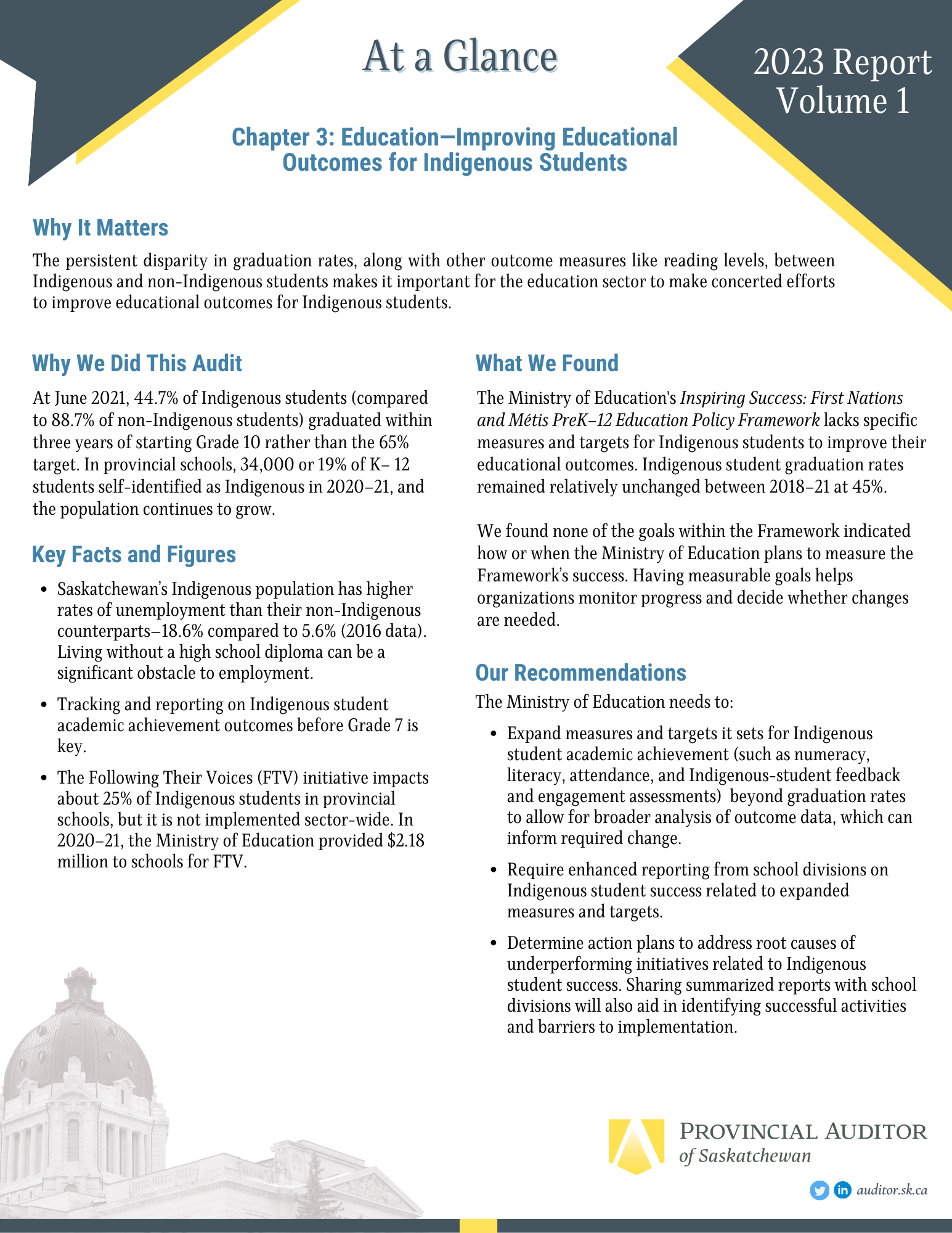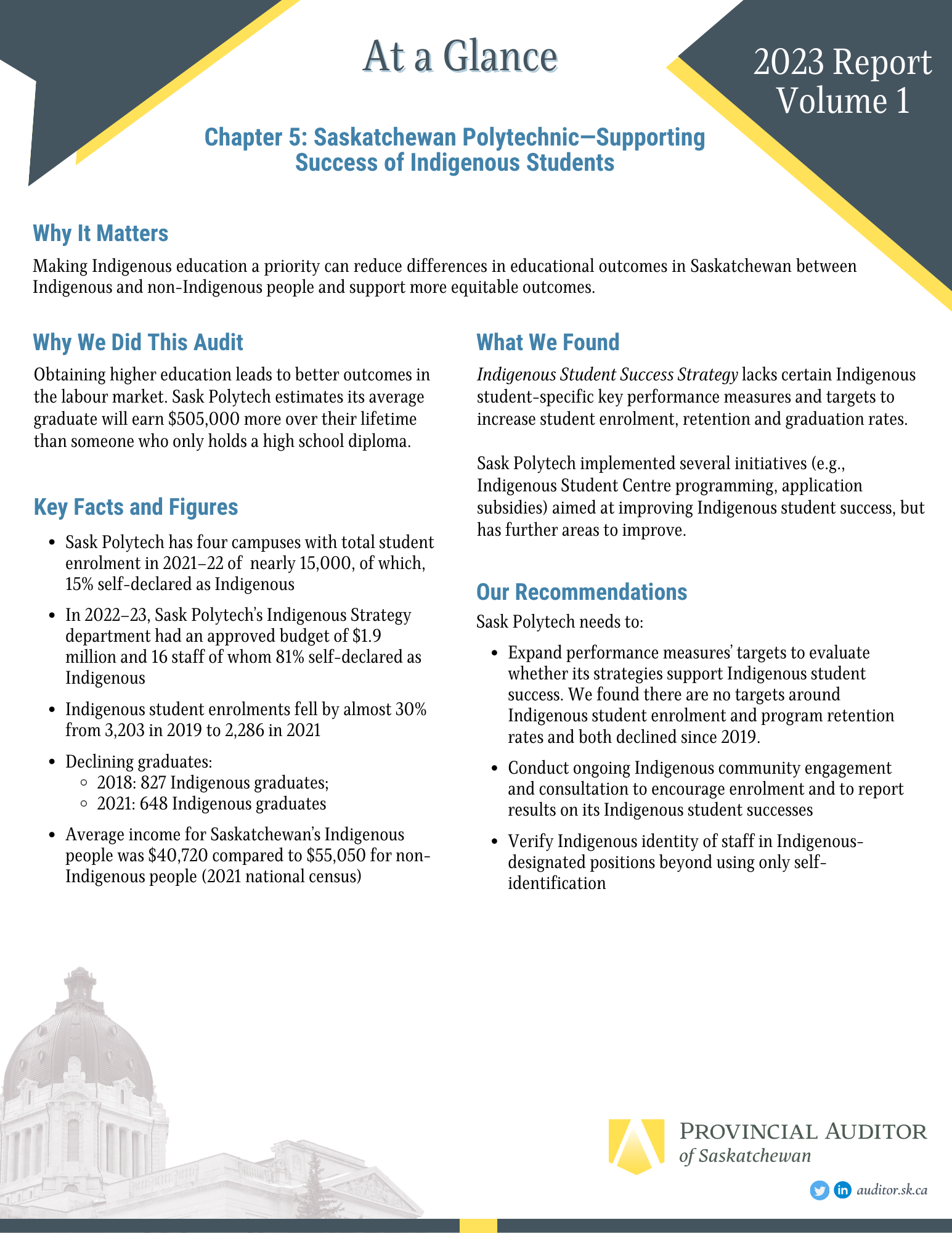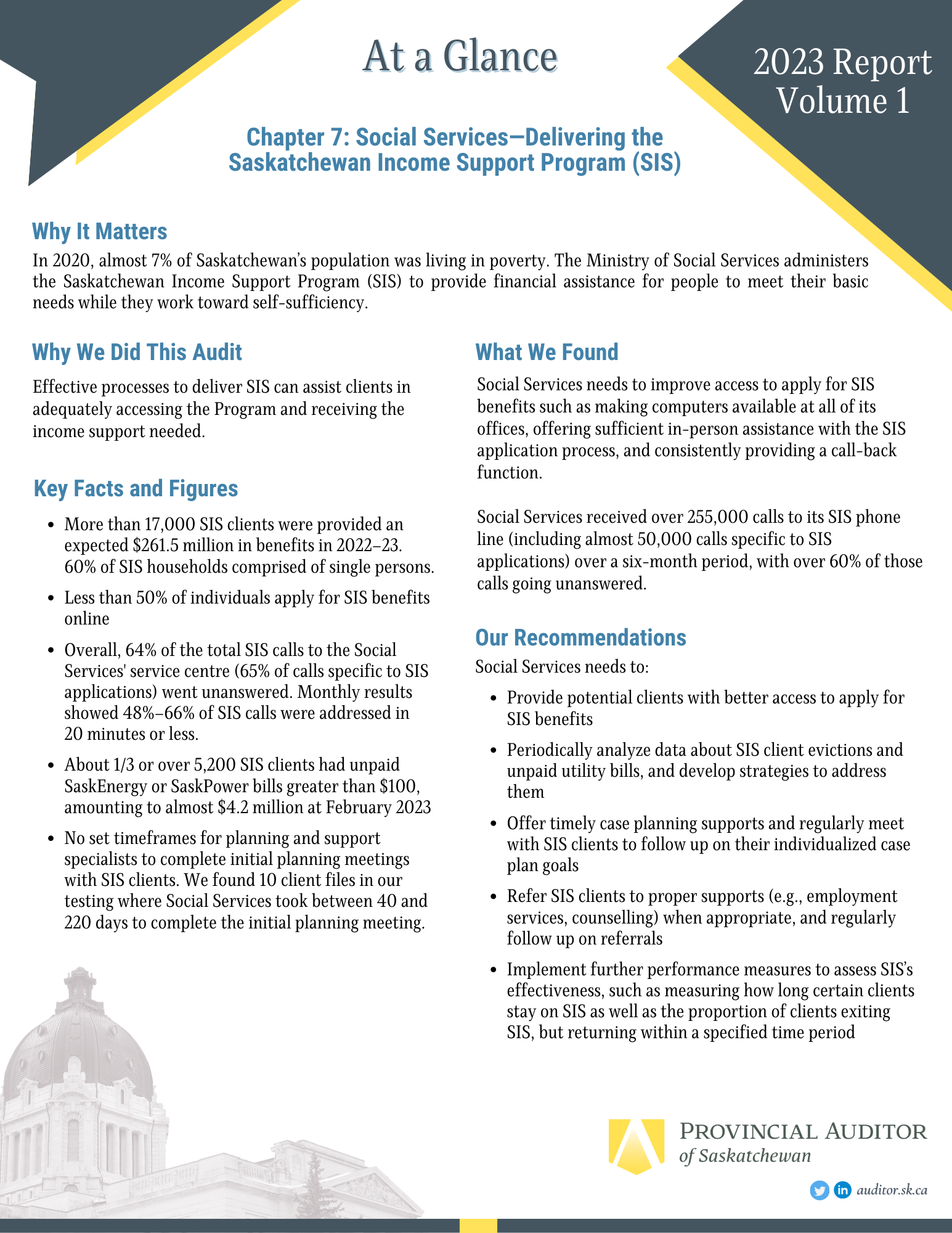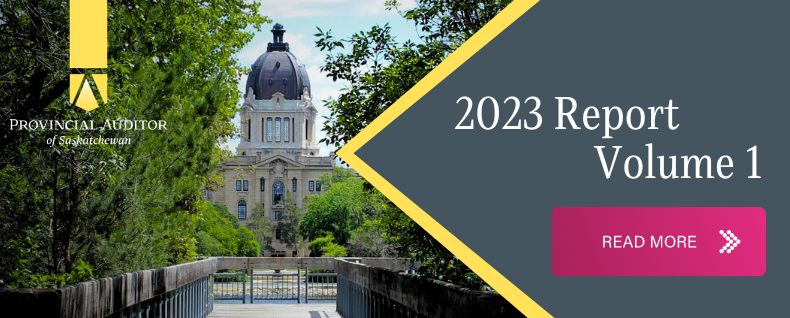2023 Report Volume 1
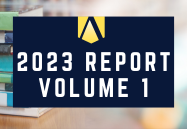 June 6, 2023
June 6, 2023
Our 2023 Report – Volume 1 provides legislators and the public critical information on whether the Government issued reliable financial statements, used effective processes to administer programs and services, and complied with governing authorities. It includes the results of examinations of different agencies completed by May 5, 2023, with details on annual integrated and performance audits, as well as our follow-up audit work on previously issued recommendations by our Office and agreed to by the Standing Committee on Public Accounts or Standing Committee on Crown and Central Agencies. This includes the results of five non-financial performance audits and 19 follow-up audits.
Annual Integrated Audits' Highlights
Since our last Report (2022 Report – Volume 2), our Office, along with appointed auditors (if in place), completed annual integrated audits of 58 different agencies with fiscal year-ends between July and December 2022. These include integrated audits of 27 school divisions and 18 pension and employee benefit plans.
This section includes concerns at certain school divisions and one government agency, which means most agencies had effective financial-related controls, complied with financial and governance-related legislative authorities, and prepared reliable financial statements.
Thirteen school divisions (Chapter 2) require improved monitoring of a key financial IT system and its related IT service provider. The service provider did not update the financial IT system for system vulnerabilities until 2022 (outdated since 2021). Adequate monitoring of the IT system and service provider would help school divisions identify and make decisions about mitigating risks to reduce the likelihood of unauthorized access or changes to the system.
The Ministry of Government Relations requires better financial oversight of the Northern Municipal Trust Account (Chapter 1). The Ministry corrected the Trust Account’s 2021 draft financial statements by over $900,000, but not until February 2023. This delayed providing the Trust Account’s annual report to the Legislative Assembly by the dates required by law; the Ministry has not tabled the Trust Account’s annual report on time since 2014. The Ministry also needs to obtain and use updated engineering information when estimating costs to decommission Trust Account landfills, and also obtain legislative authority to provide grants from the Trust Account to northern municipalities for landfills not wholly owned by the Ministry. Accurate and timely financial statement reporting is important for stakeholders who rely on the information to make critical decisions.
Performance Audits
Performance audits take a more in-depth look at processes related to the management of public resources or compliance with legislative authorities. Performance audits span various topics and government sectors. In selecting which areas to audit, we attempt to identify topics with the greatest financial, social, health, or environmental impact on Saskatchewan. Three highlighted performance audits 'At a Glance' are as follows:
Chapter 3 'At a Glance' Improving Educational Outcomes for Indigenous Students
Chapter 5 'At a Glance' Supporting Success of Indigenous Students at Saskatchewan Polytechnic
Chapter 7 'At a Glance' Delivering the Saskatchewan Income Support Program (SIS)
Follow-Up Audits
Overall, agencies implemented more recommendations on an overall basis (62%) than our most recent Report (2022 Report – Volume 2: 59%). We are happy to see agencies acting on our recommendations in a timelier manner, as this means public sector management is improving.
The extent to which agencies implement recommendations demonstrates whether the recommendations reflect areas that are important to improve public sector management, and whether agencies act on them quick enough. We do our first follow-up audit either two or three years after the initial audit, and every two or three years thereafter until the agency either implements the recommendations or we identify them as no longer relevant. We expect some recommendations will take government agencies a longer period to implement (e.g., five years).
As shown in Figure 1, 45% of the audit recommendations in this Report were fully implemented after the initial follow up (i.e., 2–3 years after original audit) at the various agencies. For agencies with subsequent follow-ups (i.e., >3 years after original audit) in this Report, 88% of audit recommendations have been fully implemented.
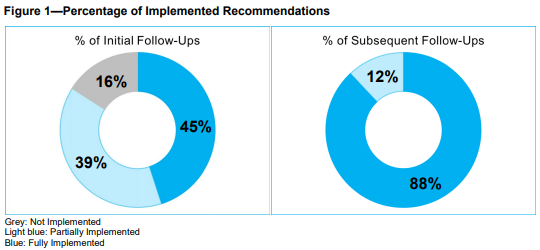
Some agencies like the Office of Residential Tenancies (Chapter 14) succeeded in making improvements in a relatively short period.
However, further work is needed at some agencies.
The Water Security Agency (Chapter 26) did not make significant progress on four of our audit recommendations from 2020. The Agency is responsible for monitoring water allocation and usage, mainly from surface water sources in Saskatchewan. Irrigation and municipal water comprise the largest two uses of water, accounting for almost 80% of the surface water currently allocated in the province. The Agency still needs to actively monitor whether the 16,000 water-use licensees comply with their licence conditions, or use more water than allowed. The Agency also needs to develop enforcement procedures and give senior management reports on non-compliance. Effective monitoring is key to Saskatchewan having a sustainable water supply for generations to come.
The Saskatchewan Health Authority (Chapter 20) also has more work to do for treating patients at risk of suicide in northwest Saskatchewan. The Authority needs to conduct suicide screening on all emergency department patients at risk of suicide to ensure psychiatric evaluations occur prior to discharge, and follow up with patients at risk of suicide after emergency department discharge. The Authority must also analyze reasons why patients do not attend scheduled appointments for mental health outpatient services or videoconferences with psychiatrists. At March 2023, the Authority had four psychiatrist positions vacant in northwest Saskatchewan. Further analysis of key data is also needed to rationalize services available to patients at risk of suicide.
Media Materials 2023 Report – Volume 1
- News Release 2023 Report – Volume 1: Improving Educational Outcomes for Indigenous Students
- News Release 2023 Report – Volume 1: Supporting Success of Indigenous Students at Sask Polytech
- News Release 2023 Report – Volume 1: Delivering the Saskatchewan Income Support Program (SIS)
- 2023 Report – Volume 1: Backgrounder
- Compilation of Main Points/Executive Summary
- Download the Full Report
(For selective viewing please click on an individual chapter from the list below)
Provincial Auditor of Saskatchewan's Overview
Tara Clemett's Complete Overview 2023 Report – Volume 1
Our Office’s mission to promote accountability and better management of public resources, while preserving our independence, provides legislators and the public with an independent assessment of the Government’s use of public resources. We do this through our audit work and publicly reported results, along with our mutual involvement with legislative committees charged with reviewing our Reports.
Table of Contents
2023 Report – Volume 1 Table of Contents
Annual Integrated Audits
1 Government Relations—Northern Municipal Trust Account
Performance Audits
3 Education—Improving Educational Outcomes for Indigenous Students
4 Highways—Conducting Winter Maintenance on Provincial Highways
5 Saskatchewan Polytechnic—Supporting Success of Indigenous Students
6 Saskatchewan Workers’ Compensation Board—Monitoring Safety Associations’ Use of Funding
7 Social Services—Delivering the Saskatchewan Income Support Program
Follow-Up Audits
8 Corrections, Policing, and Public Safety—Providing Disaster Assistance
9 Education—Capital Asset Planning for Schools
10 Energy and Resources—Managing Future Cleanup of Oil and Gas Wells
11 Environment—Preventing the Entry and Spread of Aquatic Invasive Species in Saskatchewan
12 Health—Coordinating the Appropriate Provision of Helicopter Ambulance Services
14 Office of Residential Tenancies—Adjudicating Tenancy Disputes
15 Prairie Spirit School Division No. 206—Maintaining Facilities
16 Regina Roman Catholic Separate School Division No. 81—English as an Additional Language Programming
17 Saskatchewan Cancer Agency—Screening Program for Breast Cancer
18 Saskatchewan Health Authority—Triaging Emergency Department Patients in Saskatoon Hospitals
19 Saskatchewan Health Authority—Safe and Timely Discharge of Patients from Regina Hospitals
20 Saskatchewan Health Authority—Treating Patients at Risk of Suicide in Northwest Saskatchewan
21 Saskatchewan Research Council—Purchasing Goods and Services
22 Saskatchewan Water Corporation—Purchasing Goods and Services
23 Saskatoon School Division No. 13—Kindergarten Readiness to Learn
24 SaskBuilds and Procurement—Securing the Data Centre
25 St. Paul’s Roman Catholic Separate School Division No. 20—Promoting Good Student Health
26 Water Security Agency—Regulating Water Use
Appendices
1-1 Agencies Subject to Examination under The Provincial Auditor Act and Status of Audits
2-1 Report on the Financial Statements of Agencies Audited by Appointed Auditors
All Prior Reports
All prior reports are available here for your reference.
Acknowledgments
Our Office continuously values the cooperation from the staff and management of government agencies, along with their appointed auditors, in the completion of the work included in this Report. We are grateful to the many experts who shared their knowledge and advice during the course of our work.
We also appreciate the ongoing support of the all-party Standing Committees on Public Accounts and on Crown and Central Agencies, and acknowledge their commitment in helping to hold the Government to account. Our Office remains focused on serving the Legislative Assembly and the people of Saskatchewan.
As Provincial Auditor, I am honoured to lead the Office, and our team of professionals. I am truly proud of their diligence and commitment to quality work. Our team’s steadfast professionalism helps us fulfill our mission—to promote accountability and better management by providing legislators and Saskatchewan residents with an independent assessment of the Government’s use of public resources.


